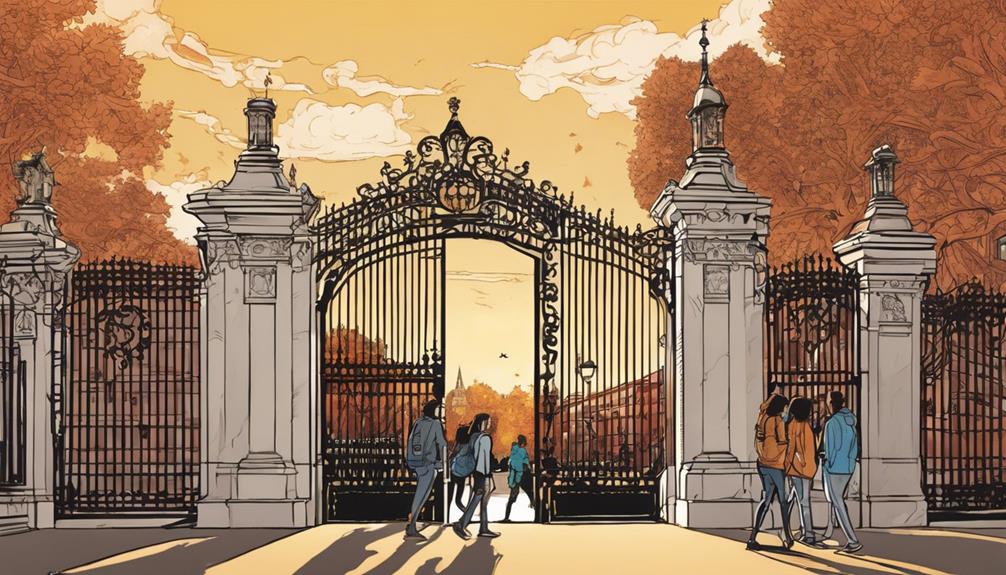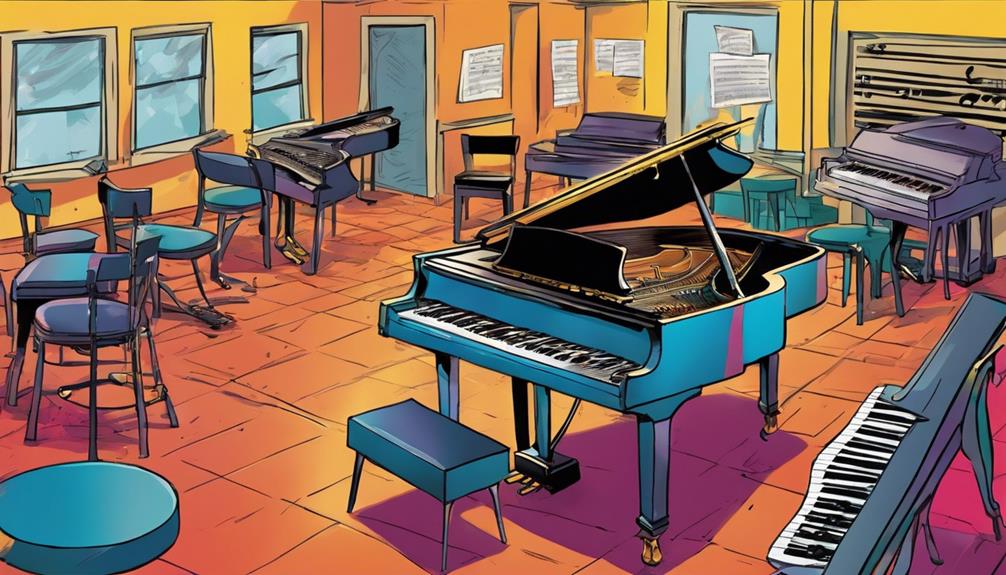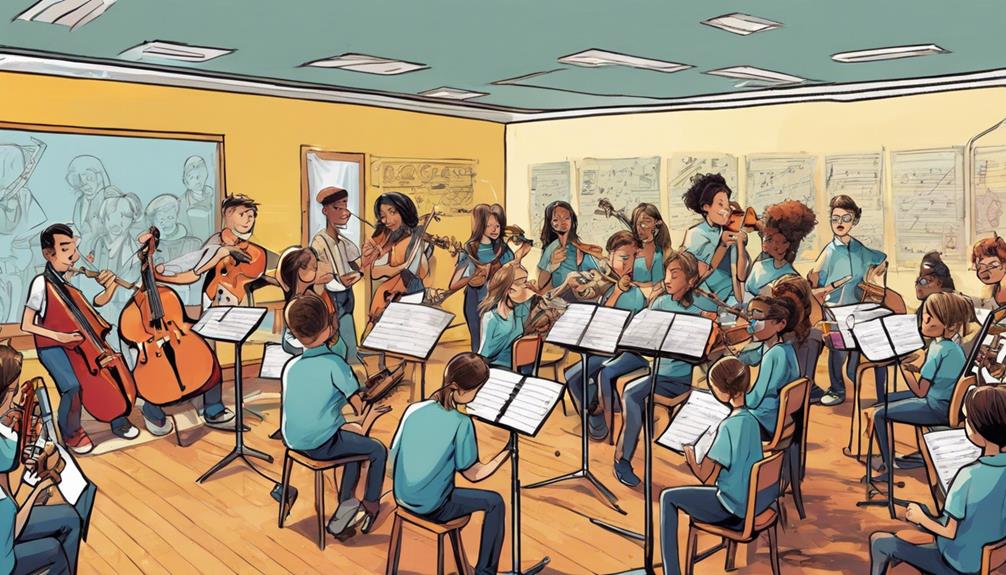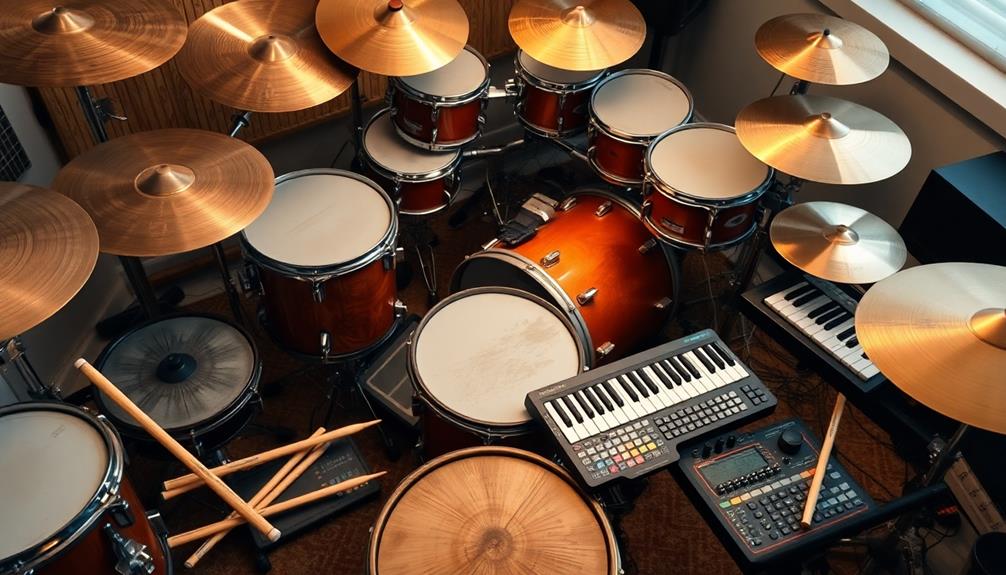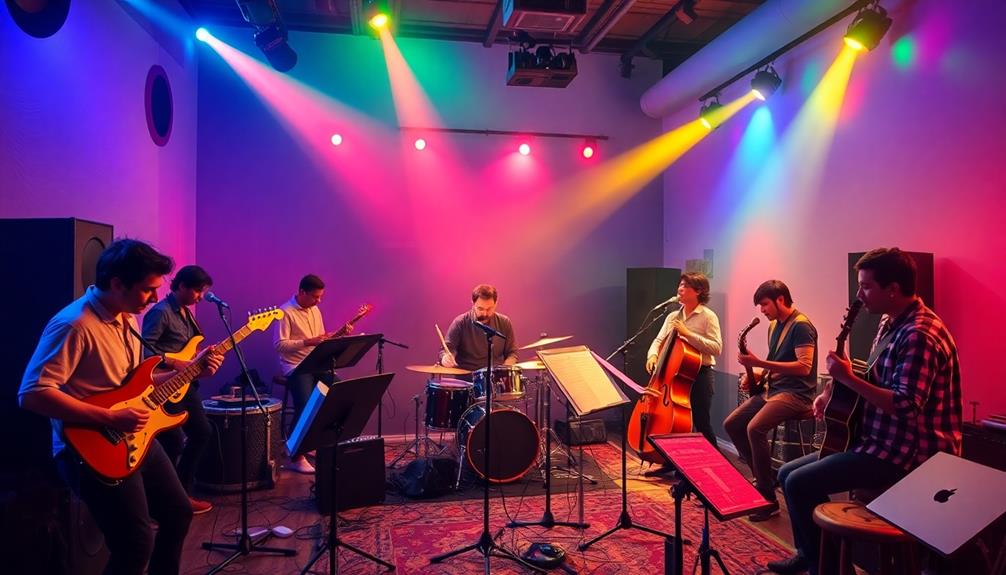To get accepted into Yale Music School, you'll need to navigate a thorough application process. First, submit your online application by December 1, including a $150 fee and thorough audition recordings or portfolios tailored to your specific degree program. Certain programs, like Choral Conducting and Early Music Voice, have additional requirements. Make sure to review program-specific guidelines and showcase your best performances. You'll also need to provide recommendations from music teachers, ensemble directors, or mentors, and craft a strong personal statement highlighting your unique strengths and qualifications. By meeting these requirements, you'll be one step closer to joining Yale's elite music community – and there's more to learn about the process ahead.
Key Takeaways
- Meet the December 1 application deadline and submit all materials online with a $150 application fee.
- Prepare a high-quality prescreening recording that showcases your best musical performance to secure a live audition invitation.
- Tailor your application to specific degree programs, considering additional requirements, such as the Institute of Sacred Music application for Choral Conducting.
- Craft a strong personal statement highlighting your unique strengths, interests, and aspirations in music, aligned with Yale Music School's programs and values.
- Choose recommenders who can speak to your musical abilities and provide them with specific program information and ample time to write thoughtful letters.
Application Requirements Overview
To apply to the Yale School of Music, you'll need to meet specific requirements, including a December 1 deadline, online submission of all materials, and a $150 application fee. This prestigious institution has a thorough application process, and it's important to understand what's required to increase your chances of getting in.
When preparing your application, keep in mind that all materials, including prescreening recordings, must be submitted online. This guarantees a streamlined process for both you and the admissions committee. Additionally, be aware that certain degree programs may have extra requirements, such as dual applications or supplemental materials. It's critical to review the specific requirements for your desired program to avoid any mistakes or omissions.
If you have any questions or concerns, don't hesitate to reach out to the admissions office at gradmusic.admissions@yale.edu. By understanding these requirements, you'll be well on your way to submitting a strong application to the Yale School of Music.
Audition and Portfolio Guidelines
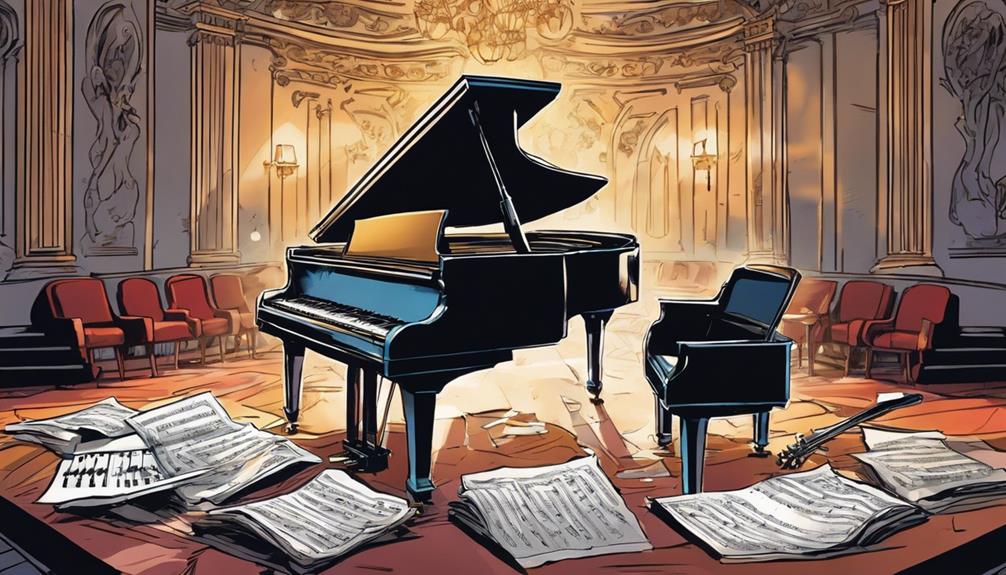
As you prepare your application to Yale School of Music, you'll need to submit audition recordings or a portfolio, depending on your program and instrument.
It's crucial to review the detailed guidelines on the school's website, which outline specific repertoire requirements and submission formats.
Audition Requirements Listed
You'll need to submit prescreening recordings with excellent audio quality as part of Yale School of Music's audition requirements. These recordings are vital, as they'll be reviewed by the admission committee to determine whether you'll be invited for a live audition.
Note that specific programs, such as choral conducting, early music voice, and organ, have additional requirements, so be sure to check the school's website for detailed information.
As a vocal performance applicant, your audition performance is paramount. The competition is extremely high, with only exceptional performers selected based on their auditions and faculty recommendations.
To increase your chances of getting in, it's crucial to prepare thoroughly for your audition. This includes practicing your pieces until you can perform them flawlessly, as well as preparing for any additional components, such as sight-reading or ear training exercises.
Portfolio Content Guidelines
Frequently, the key to a successful audition lies in crafting a portfolio that showcases your musical versatility and technical expertise.
To increase your chances of getting into the Yale School of Music, it's essential to select pieces that demonstrate your range and mastery of different styles and periods.
When preparing your audition portfolio, remember to include:
- A Baroque piece to highlight your technical proficiency
- A Classical piece to showcase your musicality and interpretation skills
- A Romantic piece to demonstrate your expressiveness and emotional depth
- A 20th/21st-century piece to exhibit your ability to tackle complex and contemporary repertoire.
Submission Process Timeline
To guarantee a smooth and successful application process, submit your audition recordings by December 1 each year, and carefully review the specific requirements for your program on the Yale School of Music's website. This deadline is essential, as it ensures that your application is complete and ready for review.
When preparing your audition recordings, remember that they must showcase your best performances, as they're a critical component of the application process.
For certain programs, such as composition, there are specific requirements outlined on the school's website. Make sure to review these guidelines carefully, as they may differ from the general audition requirements.
Detailed guidelines for both audition and portfolio submissions are available on the Yale School of Music admissions webpage, so be sure to check it frequently for updates and reminders.
Degree Programs and Options
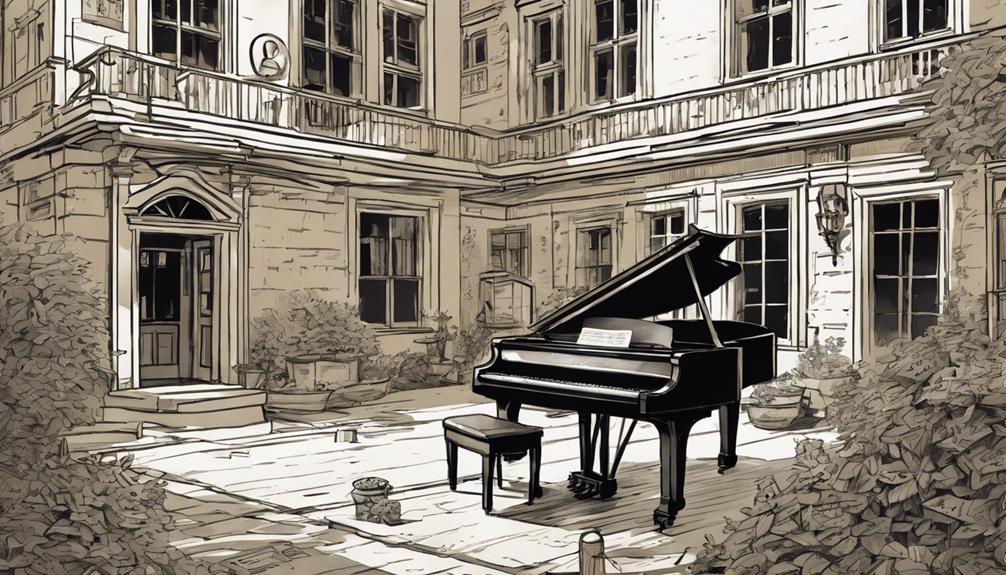
Yale School of Music's diverse degree programs cater to your unique musical interests and goals, offering a range of options to suit your needs. As a music student, you'll have the opportunity to explore various degree paths that align with your aspirations.
The B.A./M.M. options provide additional requirements, allowing you to tailor your education to your specific needs.
Certain programs don't require an additional application fee, making the application process more accessible.
The Institute of Sacred Music application is required for specific programs and aligns with the Yale School of Music application deadline, ensuring a streamlined process.
Dual application requirements exist for certain programs, detailing the submission process for each, and fee waivers are available for specific applicants, ensuring accessibility to the application process.
Program-Specific Admission Rules
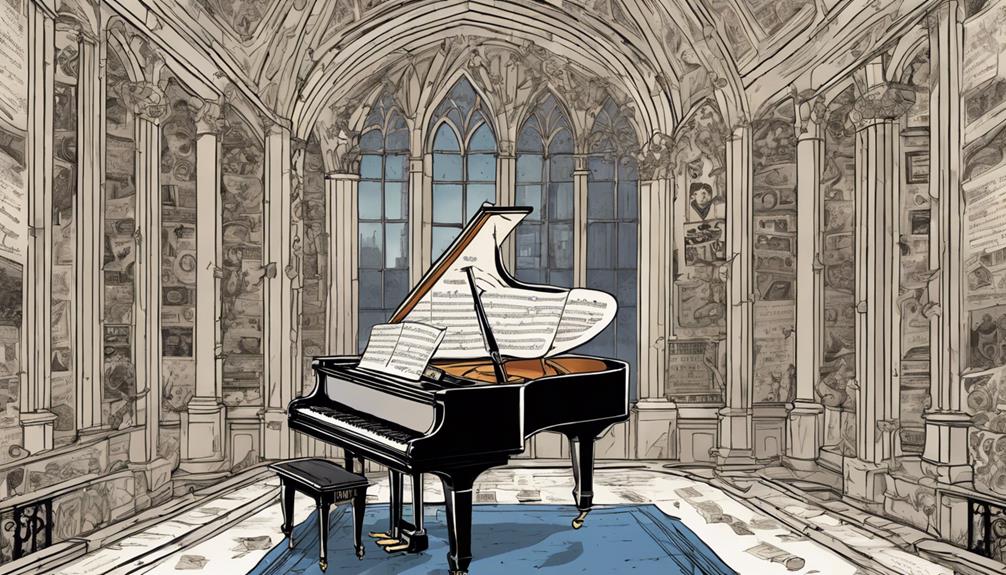
To guarantee meeting specific admission requirements for certain programs at Yale School of Music, such as choral conducting, early music voice, and organ, which go beyond the general application process. These programs have unique demands that must be fulfilled in addition to the standard application.
| Program | Additional Requirements |
|---|---|
| Choral Conducting | Institute of Sacred Music application |
| Early Music Voice | Supplementary materials by deadline |
| Organ | Dual application requirements |
For instance, if you're applying to the choral conducting program, you'll need to submit the Institute of Sacred Music application along with your Yale School of Music application. Similarly, early music voice applicants must submit supplementary materials by the deadline to be considered for admission. Organ applicants, on the other hand, need to meet dual application requirements. It's crucial to review the specific program details carefully to make sure you meet all the necessary admission requirements. If you have any questions, don't hesitate to reach out to gradmusic.admissions@yale.edu for guidance.
Recommendations and Letters
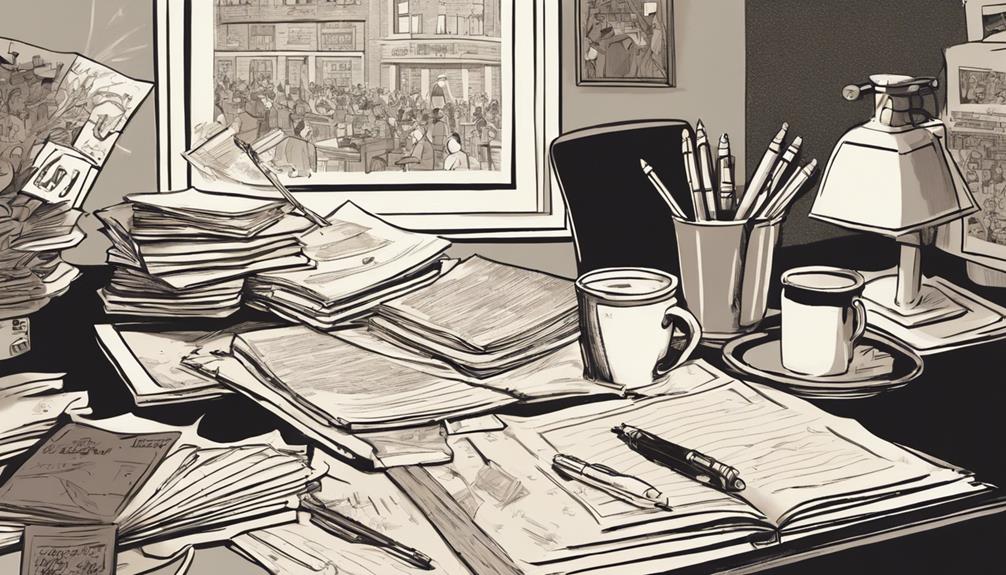
When preparing your application to the Yale School of Music, it's crucial to think carefully about who'll write your letters of recommendation and how they can craft compelling letters that showcase your musical abilities.
You'll want to choose recommenders who know you well and can provide specific examples of your achievements, highlighting your skills, dedication, and potential for success in the program.
Selecting Recommenders
Selecting the right recommenders is an important step in the application process, one that can greatly impact the strength of your application. When it comes to getting into Yale Music School, you'll want to choose recommenders who can speak to your musical abilities, work ethic, and potential for growth in the field.
Here are some tips to keep in mind:
- Choose recommenders who've observed your musical progress and can provide detailed examples of your talent and dedication.
- Consider selecting a mix of music teachers, ensemble directors, or other musical mentors to provide varied perspectives on your abilities.
- Make sure to provide your recommenders with specific information about the program you're applying to and why you're a good fit for it.
- Give your recommenders enough time to write thoughtful and personalized letters that highlight your strengths as a musician.
Crafting Compelling Letters
When crafting compelling letters of recommendation, it's important to showcase your unique strengths and qualifications as a musician by highlighting specific examples of your achievements and experiences. Strong letters of recommendation from music professionals can provide valuable insight into your musical abilities and potential. These letters should highlight your dedication, talent, work ethic, and potential for growth in the music field. It's vital to choose recommenders who know you well and can speak to your musical accomplishments and character.
Well-crafted letters of recommendation can greatly impact the admission decision for Yale Music School. They should include specific examples of your musical achievements and experiences, adding depth and credibility to the recommendation. By highlighting your unique strengths and qualifications, you can demonstrate your potential to excel at Yale Music School.
Crafting a Strong Personal Statement

To craft a strong personal statement for Yale Music School, you'll need to distill your passion for music, unique experiences, and career aspirations into a compelling narrative that showcases your individuality and goals. This is your opportunity to stand out from other applicants and demonstrate why you're the perfect fit for Yale Music School.
Here are some essential points to keep in mind:
- Highlight your specific interests within the field of music and how they align with Yale Music School's programs and values.
- Share your unique perspective and experiences that set you apart from other applicants, such as musical achievements, projects, or volunteer work.
- Explain how attending Yale Music School will help you achieve your academic and career aspirations in music.
- Use a clear, concise, and engaging writing style that reflects your genuine voice and personality.
English Proficiency Requirements

As a non-native English speaker applying to Yale School of Music, you'll need to demonstrate your English proficiency by submitting TOEFL or IELTS scores that meet the school's requirements. This is vital, as adequate English proficiency is essential for successful communication and participation in the program. To increase your chances of admission, it's recommended that you achieve a minimum TOEFL score of 100 or an IELTS score of 7.
Make sure to take the exam within two years of the application deadline, as scores older than that won't be accepted. If you're from a country where English is an official language, you might be exempt from taking the exam, so be sure to check the school's list of exempt countries.
Application Deadlines and Timeline
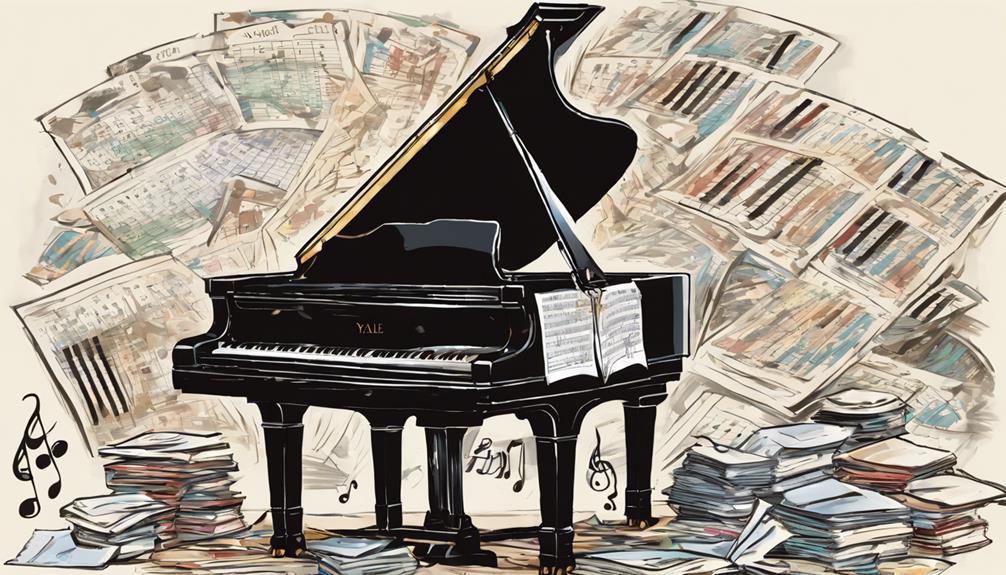
You'll need to mark your calendar with Yale School of Music's application deadline of December 1 each year, with the online application becoming available on September 15 for prospective applicants. Make sure to plan ahead, as supplementary materials sent by mail must be postmarked by December 1 to be considered.
Here are some key points to keep in mind:
- Specific programs like choral conducting, early music voice, and organ have additional requirements and deadlines, so be sure to check those carefully.
- Don't wait until the last minute – give yourself time to gather all necessary materials and submit a strong application.
If you have any questions or need more information, you can contact gradmusic.admissions@yale.edu** for assistance.
**Mark your calendar for September 15 to get a head start on the application process.
Prescreening and Live Auditions
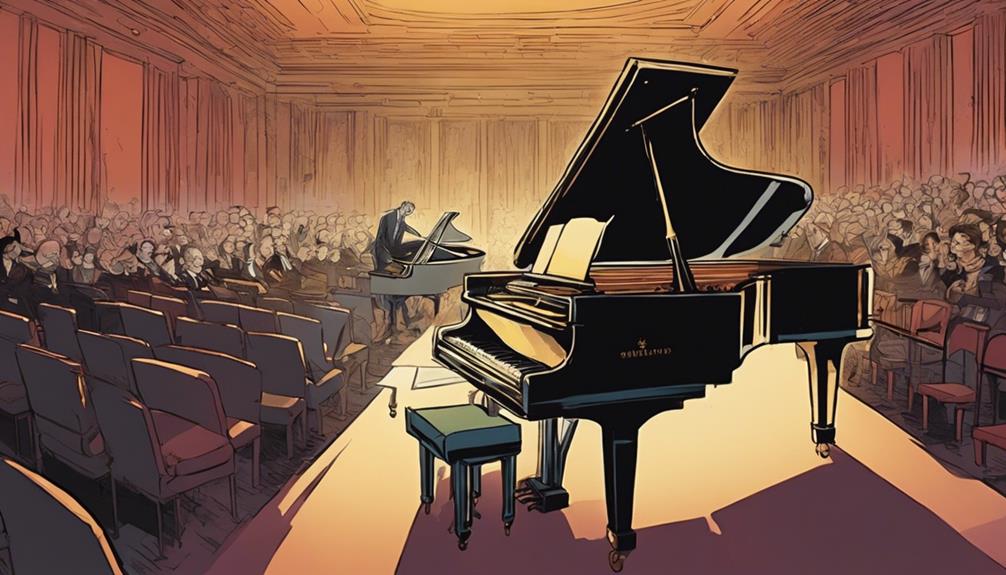
Prescreening recordings serve as the initial showcase of your musical talents, and high-quality audio submissions are vital for advancing to the next stage of the Yale School of Music's admission process. As an applicant, you'll need to submit these recordings as part of your application, and it's imperative that they're of high quality. This is because prescreening is a required step for all applicants, and it's used to determine whether you'll be invited to a live audition.
If your prescreening recordings impress the faculty, you'll be invited to a live audition. This is a critical component of the admission process, as it allows faculty to assess your musical abilities in person. The quality of your live audition performance will greatly influence the admission decision, so it's crucial to prepare thoroughly.
During the audition, you'll have the opportunity to showcase your skills and demonstrate your artistry. By acing your prescreening and live audition, you'll be one step closer to securing a spot at the prestigious Yale School of Music.
Special Programs and Fellowships
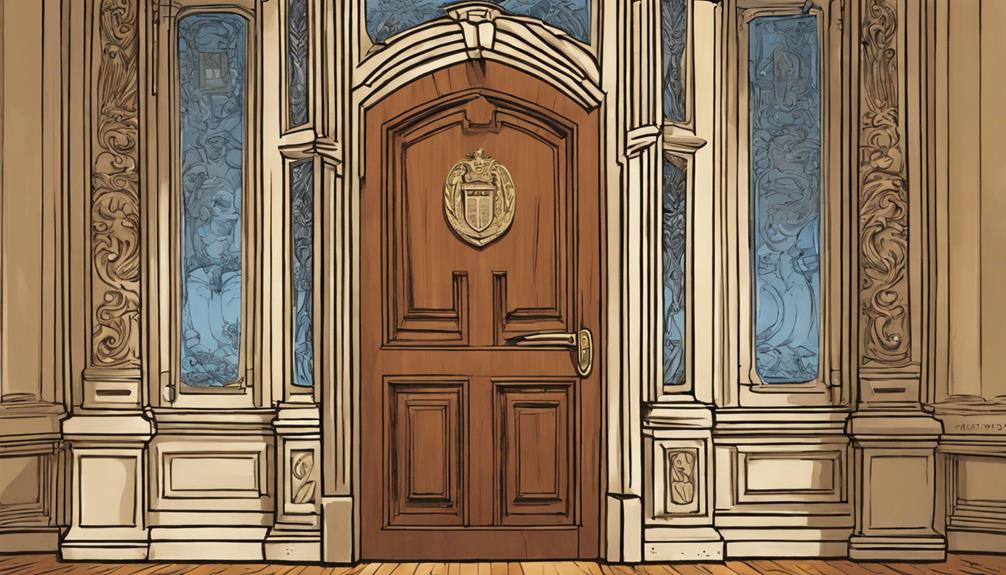
As you explore the opportunities at Yale School of Music, you'll find that exceptional applicants can take advantage of special programs like the B.A./M.M. program, which offers a unique learning experience.
Additionally, the school provides fellowships that support talented students in various music disciplines, offering financial aid packages and elite performance opportunities.
Elite Performance Opportunities
At Yale School of Music, elite performance opportunities abound through special programs and fellowships that provide exceptional musicians with unforgettable experiences and valuable support. As a student, you'll have access to a range of programs designed to take your skills to the next level.
Some of the elite performance opportunities you can look forward to include:
- The Yale Baroque Opera Project, which offers a unique chance to perform in a specialized opera program
- Fellowships like the Morse Fellowship, which provide financial support to exceptional musicians
- The Oneppo Chamber Music Series, which offers performance opportunities for outstanding chamber musicians
- Specialized programs like the Collection of Musical Instruments, which provide unique performance experiences
These opportunities won't only enhance your skills but also give you a competitive edge in the music industry. By taking advantage of these programs, you'll be able to perform with world-class musicians, gain valuable experience, and make lasting connections in the music world.
Financial Aid Packages
Securing financial aid is an essential step in pursuing your musical dreams at Yale School of Music, where various packages, including scholarships, fellowships, and assistantships, are available to support your education. These financial aid packages are based on both merit and need, ensuring that talented students from diverse backgrounds can access the school's elite programs.
You may be eligible for specific programs like the Morse Fellowship or the Dean's Emerging Artist Fellowship, which provide additional financial support to exceptional students. As a graduate student, you may receive full tuition coverage, stipends, and health insurance through assistantships or fellowships. The School of Music also offers travel grants, summer funding, and research support to help you pursue your musical aspirations.
To navigate these funding options, the financial aid office at Yale School of Music provides personalized assistance, ensuring you get the support you need to focus on your music. By exploring these financial aid packages, you can make your dream of studying at Yale School of Music a reality.
Frequently Asked Questions
How Hard Is It to Get Into Yale School of Music?
"It's extremely tough to get into Yale School of Music, where only a tiny percentage of applicants are accepted each year, making it a highly competitive and elite institution." Competition is fierce, with applicants needing not just exceptional talent but also a strong academic and artistic portfolio to stand out. Many prospective students seek guidance from various resources, such as forums or blogs offering insights, alongside advice like Harvard Music School application tips, to improve their chances of success. Ultimately, both dedication to craft and strategic preparation are essential for navigating the rigorous selection process at such a prestigious institution.
How Do I Get Noticed by Yale?
"You're vying for one of just 100 spots at Yale School of Music Did you know only 7% of applicants get in? To get noticed, showcase exceptional musical talent, strong academics, and outstanding recommendations."
What Is the Acceptance Rate for Yale Music Graduate Students?
The acceptance rate for Yale Music graduate students is extremely low, around 5-10%. You'll need to be among the best of the best to get in, with outstanding auditions and faculty recommendations.
Does Yale Rea Help?
"No, Yale Real Estate Association (REA) won't help you get into Yale Music School, as it's a separate entity focused on music performance and composition. Your audition and faculty recommendations are key."
Conclusion
You've made it to the final note. Granting you've followed the harmony of guidelines and requirements, your application will resonate with the Yale Music School admissions committee.
As you submit your application, imagine the sweet serenade of success – a symphony of hard work, dedication, and passion.
Now, take a deep breath, hit submit, and let your musical journey begin.



